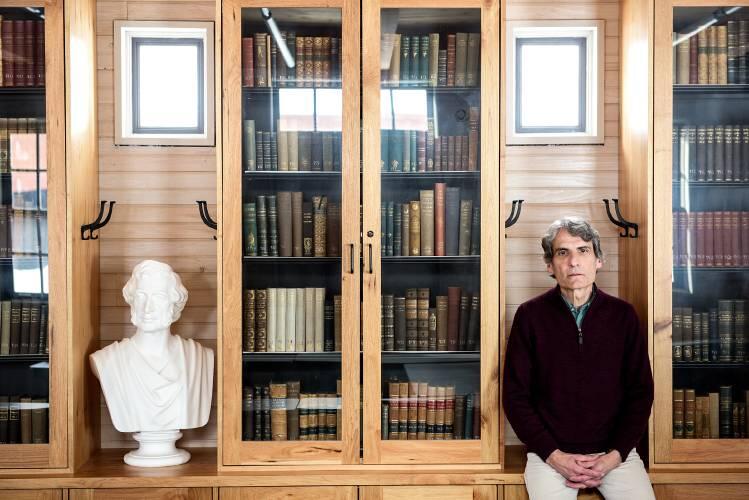The Garden of Wisdom: Earth Tales from the Middle East, edited by Michael J. Caduto and illustrated by Odelia Liphshiz; Greenheart Books, 160 pages; $26.95
The phrase “environmental education” can sometimes sound as if one is being asked to swallow a dose of tapioca and cod liver oil.
But what if environmental education, particularly for children, came in the form of illustrated folk tales that impart words of wisdom with gentle good humor and empathy?
That’s a lesson that the writer and environmental activist Michael Caduto has learned over the years. He is the author and editor of more than 20 books on natural history, and Native American and Italian fables and stories, and the founder of P.E.A.C.E., Programs for Environmental Awareness and Cultural Exchange.
Caduto is also the editor of the recently-released children’s book The Garden of Wisdom: Earth Tales from the Middle East, a collection of fables and folk tales from the Middle East, with illustrations by Odelia Liphshiz. He will be giving a public reading on Saturday, Feb. 10 at 10 a.m. at the ArtisTree Community Arts Center in South Pomfret.
The stories affirm that, even in a region noted for seemingly intractable conflicts, human values of compassion, kindness, justice and the obligation to relieve suffering are universal, not particular to one culture or another. The book comprises stories from Jordan, Palestine, Israel, Egypt and Lebanon.
“Approaching environmental issues in that region happens through the aspects of culture that are really important to people — ritual, traditions, culture and family,” Caduto said in a phone interview from his home in Reading, Vt.
The project had its origin in a 2006 conference in Hungary organized by the Quebec Labrador Foundation, a non-governmental organization based in Ipswich, Mass., that focuses on the environmental and economic stewardship of rural and natural communities in eastern Canada and New England, as well as other global environmental initiatives.
Caduto, who wears many professional hats (storyteller, musician, ecologist) was asked to run a workshop on environmental education. When he mentioned the extensive work he’d done in promoting environmental education through storytelling, Tammy Keren-Rotem, director of environmental education for the Israel Nature and Parks Authority, chimed in.
Why not use a similar method in the Middle East, said Keren-Rotem, according to Caduto. Rather than taking a piecemeal, country by country approach to urgent environmental issues, maybe it was time to try something new, Caduto recalled Keren-Rotem saying. Who would be interested?
“Everyone there raised their hands and said, sure, why not?” Caduto said.
Lebanon, Palestine, Israel, Jordan, Syria and the Sinai in Egypt make up one of the most densely populated areas in the Mediterranean, with a mosaic of cultures, sects and religions set into a relatively small geographic area. Given the contentious politics, the environment may not seem as pressing a problem — at least from the outside — when compared to decades of war and violence.
However, such challenges as water pollution, the depletion of water supplies, including the drawing down of the Dead Sea, the decline of native flora and fauna, the infiltration of invasive species, the degradation of key habitat and ecosystems and the effects of war on the landscape, are inextricably part of the political situation.
“The connection between how we treat each other and how we treat nature cannot be separated,” Caduto said.
The participants in the 2006 conference recognized this: “Despite all these differences in culture and geography and the conflict, the folks sitting around the table all agreed to work on this project,” Caduto added.
Overseeing the project took Caduto 10 years. Caduto and Keren-Rotem worked on outlining the concept and book over a two-year period, with the specific objective of finding stories that related to the natural world. The Quebec Labrador Foundation put up seed money. Caduto made numerous trips to the region to talk with the researchers who were looking for stories rooted in the cultures of the indigenous peoples in each country. Meetings took place on more neutral ground, such as Turkey and Oman, so that the researchers and contributors could work without the intrusion of politics of place.
When Caduto mixed in the long arc of Middle East politics, the ongoing need to raise funds and the lengthy process of making connections, sending people out to collect stories, compiling and editing them and then arranging for publication, Caduto said he could see how a decade had passed. The book will also be available in Arabic and Hebrew translations.
Caduto’s wish is that reading the stories will help the book’s audience — children and adults — to “imagine the world as we hope it would be, and inspire them to help make that possible.”
Source: http://bit.ly/2BzWcMQ











